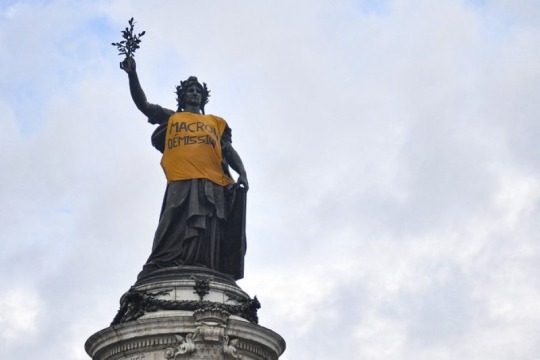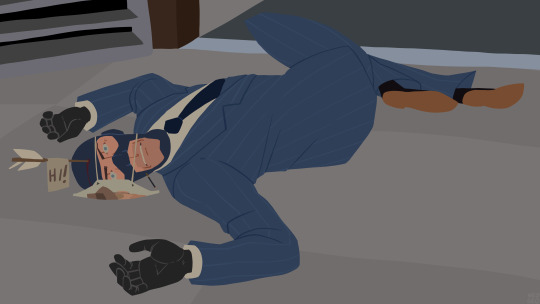#french law
Text
Finished a task 4 days earlier than it’s due date, Isn’t that great !
#travaux dirigés#TD#law student#law school#law studyblr#study inspiration#university#school anxiety#school work#law stuff#lawblr#lawyer#french#french law#sorbonne
22 notes
·
View notes
Text
This is major
For anyone not living in France, you might not have seen this on the news. But yesterday, on the 4th of March, abortion has become a constitutional right.
It is the first country worldwide to recognize that right as fundamental. And the result of the vote was overwhelming too ! (780 to 72)
What a beautiful day ☀️
2 notes
·
View notes
Text
Le barème Macron, ça vous dit quelque chose ?
Après les deux arrêts de la chambre sociale de la Cour de cassation, j’ai décidé de faire un (long) post pour essayer d’éclairer la situation pour ceux qui voudraient y voir plus clair !
Au programme : présentation du fameux barème et des récents arrêts qui lui sauvent la peau et bien sûr, mes premières réflexions sur la question. Si vous avez la flemme de tout lire, je fais un petit résumé tout à la fin, il vous suffira d’ouvrir le post et de scroller (beaucoup).
Le barème Macron, qu’est-ce que c’est ?
En bref, c’est un tableau qui prévoit des minimums et des maximums pour les indemnités qu’un salarié qui a été licencié sans cause réelle et sérieuse peut demander en justice (à noter qu’il est exclu dans certains cas les plus graves : quand le licenciement est discriminatoire par exemple). La fourchette varie en fonction de deux choses : 1° l’ancienneté du salarié ; 2° la taille de l’entreprise.
Ok mais d’abord, c’est quoi un « licenciement sans cause réelle et sérieuse » ?
Le licenciement, tout le monde voit ce que c’est, c’est l’acte par lequel l’employeur met fin à un CDI. Ce licenciement est encadré : il y a une procédure à respecter et, encore plus important, il doit être justifié. Ce qui signifie qu’on ne peut pas être licencié pour tout et n’importe quoi : c’est ça, l’exigence d’une « cause réelle et sérieuse ».
Plus précisément, l’exigence d’une « cause réelle » renvoie au fait que l’employeur doit pouvoir prouver les faits invoqués pour justifier le licenciement (ça serait trop facile de dire « je licencie Michel car il arrive tout le temps en retard », sans être capable de prouver le moindre retard).
Quant à l’exigence d’une « cause sérieuse », ça signifie que seuls des manquements assez importants peuvent justifier le licenciement car il s’agit d’une sanction et de la sanction la plus lourde qui existe en droit du travail : qui dit sanction lourde, dit manquement important en bref ! Même chose pour le licenciement fondé sur des raisons économiques : il faut que l’entreprise ait des difficultés économiques suffisamment graves pour pouvoir licencier des salariés.
Ce qu’il faut retenir, c’est qu’un licenciement est sans cause réelle et sérieuse quand l’employeur ne peut pas prouver les faits invoqués pour licencier un salarié ou bien qu’il a licencié un salarié pour des faits qui ne justifiaient pas une telle sanction. En bref, un licenciement sans cause réelle et sérieuse, c’est un licenciement qui n’aurait pas du avoir lieu !
Et pour en revenir à ce fameux barème, ça change quoi par rapport à avant ?
Avant, en cas de licenciement sans cause réelle et sérieuse, on appliquait le principe dit « de réparation intégrale » : tous les préjudices subis par le salarié étaient réparés. L’indemnité variait donc en fonction de chaque salarié, car on prenait en compte sa situation propre (son ancienneté, sa situation familiale, son « employabilité », le contexte de son licenciement…).
Désormais, c’est la même chose pour tous les salariés pourvu qu’ils aient la même ancienneté. Bon, en réalité, pas tout à fait car la loi fixe une fourchette donc le montant exact peut varier mais il ne pourra pas dépasser le maximum légal !
Et ça, c’est cool pour les employeurs car ils savent ce qu’ils risquent au pire du pire. D’ailleurs, ce barème, c’était une mesure demandée par les entreprises car ça leur permet de calculer à l’avance ce que ça va leur coûter de licencier illégalement Michel ou Germaine. Il faut bien comprendre que ça leur permet de calculer combien va leur coûter un licenciement qu’elles n’ont pas le droit de faire !
C’est là que ça pose un sérieux souci : la loi, aujourd’hui, met les entreprises en capacité d’intégrer dans leur budget le coût du non-respect des règles du licenciement. Et on voit bien que ce sont les grandes entreprises qui bénéficient de cela : le respect du droit, aujourd’hui, c’est une contrainte budgétaire donc si le budget le permet, plus besoin de respecter le droit ! Et quand je dis « le droit », ça inclut ici surtout « les droits des salariés ».
Je résume ! Le barème pose 2 problèmes :
Il réduit drastiquement les indemnités auxquelles les salariés ont le droit.
Il favorise le non-respect du droit.
« Mais, si ça favorise un comportement illégal », me direz-vous, « les juges ne vont pas laisser ça passer ! »
Oui et non.
Oui car certains juges ont décidé de tout essayer pour ne pas appliquer ce barème et continuer à pratiquer la réparation intégrale. Pour cela, ils ont notamment mobilisé des normes internationales, en particulier la convention n° 158 de l’OIT et la Charte sociale européenne. Considérant le barème contraire à ces normes, les juges ont tout simplement mis ce dernier à l’écart.
Non car la Cour de cassation vient d’enterrer tout ce travail de mise à l’écart. Pour rappel, la Cour de cassation, c’est la juridiction qui contrôle comment les juges appliquent la loi et c’est elle qui a le dernier mot dans l’interprétation des normes en France. Elle a rendu hier deux arrêts sur la question et ils devraient donc être progressivement suivi par les juges.
Les deux arrêts du 11 mai 2022
L’arrêt n° 21-14.490
Dans le premier arrêt, elle juge que le barème n’est pas contraire à l’article 10 de la C158.
Cet article prévoit qu’en cas de licenciement injustifié, les juges doivent pouvoir « ordonner le versement d’une indemnité adéquate » pour réparer le préjudice subi. Il y a eu de grandes et longues discussions sur cette notion de « réparation adéquate », pour savoir si c’est la même chose que notre « réparation intégrale » ou bien si c’est moins exigeant. Je ne rappelle pas tout ça ici, ça serait trop fastidieux !
Ce qu’il faut retenir, c’est que la Cour de cassation rappelle que pour l’OIT, la réparation adéquate, ça implique deux choses : être suffisamment dissuasive et permettre l’indemnisation de la perte injustifiée de l’emploi. Et la Cour considère que le droit français permet cela.
Selon moi, son raisonnement est un peu fallacieux car elle considère que le droit français est suffisamment dissuasif car il prévoit, par exemple, que l’employeur doit rembourser les indemnités chômage que le salarié licencié sans cause réelle et sérieuse a touché. Or, on ne lui demande pas si le droit français est dissuasif, on lui demande si le barème Macron est dissuasif !
Malgré tout, elle considère que le barème (pris dans son contexte légal donc) est conforme à la C158. Et ce, alors même que l’OIT avait été bien plus nuancée dans sa réponse à la même question qui avait été soulevée par certains syndicats français. Dans son rapport, elle avait considéré que le plafonnement des indemnités de licenciement « entraîne de fait une désindividualisation de la réparation du préjudice » et contraint le pouvoir d’appréciation des juges. Elle concluait donc que le barème n’est pas, par principe, conforme à la C158 : il ne l’est que si « une protection suffisante des personnes injustement licenciées » est assurée et que si une indemnité adéquate est versée dans tous les cas.
Elle invitait donc le gouvernement français à la prudence en lui demandant d’ « examiner à intervalles réguliers, en concertation avec les partenaires sociaux, les modalités [du barème] de manière à assurer que les paramètres d’indemnisation prévus par le barème permettent, dans tous les cas, une réparation adéquate du préjudice subi pour licenciement abusif », laissant donc entendre que ce n’est pas nécessairement le cas !
Or, la Cour de cassation ne mentionne même pas ce rapport : elle fait comme si l’OIT n’existait que par ses normes et non par son activité d’interprétation ce qui me semble tout à fait critiquable car l’OIT est certainement la mieux placée pour donner le sens de ses propres normes.
L’arrêt n° 21-15.247
Dans le deuxième arrêt, elle juge qu’on ne peut pas écarter l’application du barème en raison de son éventuelle non conformité à la Charte sociale européenne car celle-ci ne s’applique pas en France ! Bon, j’exagère un peu, elle dit que l’article 24 de cette Charte n’est pas « d’application directe ».
En réalité, ça revient au même puisqu’elle refuse d’appliquer cet article car il ne remplit par certaines conditions pour s’appliquer : même résultat et même processus arbitraire de mise à l’écart, mais c’est camouflé sous des considérations juridiques donc ça semble moins critiquable.
La Cour commencer par rappeler qu’en approuvant par la voie législative la Charte, la France « a choisi d’être liée par l’ensemble des articles de la Charte sociale européenne » (mais elle n’en tire aucune conséquence !). On pourrait penser que c’est suffisant pour que l’article 24 s’applique mais non : il faut encore vérifier qu’il est d’application directe.
La Cour le rappelle, ça requiert trois choses :
La disposition doit créer « des droits dont les particuliers peuvent se prévaloir » ;
La disposition ne doit pas avoir vocation à régir exclusivement les relations entre États ;
La disposition ne doit nécessiter « aucun acte complémentaire pour produire des effets à l’égard des particuliers ».
Et c’est cette dernière exigence qui manque ici car, selon la Cour, les États ont entendu « reconnaître des principes et des objectifs, poursuivis par tous les moyens utiles, dont la mise en œuvre nécessite qu’ils prennent des actes complémentaires d’application ». Elle en conclut que l’article 24 de la Charte sociale européenne est dépourvu d’effet direct donc qu’il ne peut pas être appliqué dans ce litige : le barème est-il conforme à cette Charte ? Qu’importe puisqu’elle ne s’applique pas ici !
C’est une décision en opportunité selon moi car la formulation de la C158 et celle de la Charte sociale européenne sont sensiblement les mêmes :
C158, a. 10 : « […] ils devront être habilités à ordonner le versement d’une indemnité adéquate ou toute autre forme de réparation considérée comme appropriée. » + l’article 1 précise que l’application de cette convention devra être assurée par voie de législation nationale, ou toute autre voie conforme à la pratique nationale.
CSE, a. 24 : « […] les Parties s’engagent à reconnaître : […] b. le droit des travailleurs licenciés sans motif valable à une indemnité adéquate ou à une autre réparation appropriée. »
J’ai personnellement du mal à comprendre pourquoi la CSE serait dépourvue d’effet direct alors même que la C158 s’est vue reconnaître implicitement ce même effet direct. Peu importe que la Cour fasse bien application des critères juridiques de l’effet direct puisque c’est le choix de les appliquer ou non qui est ici arbitraire !
En bref
Le barème Macron est un instrument qui permet aux entreprises (aux grandes entreprises en particulier) de budgétiser le non respect des règles du licenciement.
C’est une mesure néfaste pour les salariés comme pour le droit lui-même, étant donné que son non-respect peut se monnayer.
La Cour de cassation a décidé de faire preuve d’une grande lâcheté en mobilisant les normes de droit international comme cela l’arrange : elle contrôle l’effet direct uniquement quand cela lui convient et elle fait fi de la position de l’OIT, pourtant la mieux place pour interpréter ses propres normes.
Le barème Macron continue donc de s’appliquer, malgré les arguments très solides qui plaidaient en sa défaveur !
Je ne sais pas si quelqu’un aura eu le courage d’aller jusqu’au bout de ce post mais si c’est le cas, merci ! J’espère avoir été assez claire pour que ce soit compréhensible pour des gens peu habitués au droit comme pour des juristes.
N’hésitez pas si vous avez des questions sur le sujet ou des suggestions, si vous avez apprécié l’idée et que vous aimeriez lire un truc dans ce genre mais sur d’autres thèmes !!
#barème macron#french#france#french stuff#upthebaguette#french side of tumblr#french law#french studyblr
16 notes
·
View notes
Text
In France, home-invasion is a plague protected by the law
You know what makes me sick? Squatting. Aka those people that sneak into houses and flats that are not theirs, and claim it as their own house.
Because in France, squatters and squatting is a true plague. It is a true plague because home-invaders are PROTECTED BY THE LAW! Yep, French law is just so sick.
Let me give you an example.
A grandmother lives alone in a little house somewhere in the suburbs. One day, she gets dementia and has to be hospitalized. Her daughter arrives. She takes her out of her house, because it is too dangerous for her to leave alone, and she takes her to the hospital, and then to a retirement house. Meanwhile the grandmother’s own little house stands empty. Well-closed, but empty. When the daughter discovers that to pay for the retirement home (and not to throw her mother into the public hell-holes where they beat up elder people) she needs more money than planned, she decides to sell her grandmother’s empty home. It is where she spent her childhood, but her mother’s health is more important.
But as she discovers, a family entered the house. They broke into the house one night, changed the locks and are now living in the house. They are squatters. They claim the house is theirs, and that they will stay there, and not leave.
You say: but the house does not belong to them! The daughter can still call the police for them to get out, no? Well... No. Because the law protect these kind of home-invaders. You see, there is a loophole in the French law. People can’t be dislodged of their domicile. But “domicile” has a very vague meaning in the French law - it is just your main dwelling. If you can prove that you live somewhere all the time, then it becomes your “domicile”. You don’t even have to own the place.
And that’s how all the squatters and home-invaders work. They enter a place they never bought or that does no belong to them. They sign up contracts to install something : it can be a contract with a new electric company ; it can be a contract to install Internet or a new phone line ; any kind of contract works. Companies never check if people own the place they claim to be their domicile. So the companies do their work there, leave their contracts, and these contracts are enough. They are proofs that this place is your domicile. Home-invaders just present them to the law and say “This is proof that it is my domicile. We might not own the place, but we still live there, we claimed it as our domicile, and so you can’t get us away”. And thus the daughter can’t sell or even enter her mother’s house, and has to enter a long legal battle to get back the ownership of the place. A very costy battle, as it will need the hiring of several law experts.
Because here you see, the home-invaders have all on their side. They claim the house was “abandoned” - and this already puts the law in their favor because invading an abandoned place is less punishable than an “occupied” place, and if the home is empty long enough, it can be claimed “abandoned” by unscrupulous people. Proving it is not means spending money to prove it in front of the law. As the home-invaders did not rent the place, there is no “renter-owner” relationship between the two, and the daughter can’t even have them expelled through her quality of owner. And the home-invaders are a family! EVEN BETTER! Because when squatting is proven, people can be expelled quite fast... if there is just one person. Multiple persons, it takes longer. And if there are children? Even longer - especially if they are minors. That’s why nowadays most squatting cases are about families invading so-called “abandoned” buildings. Or even whole groups! We are talking groups of twenty to forty people! Of course the living conditions tend to be dreadful, with filth, overcrowding and more... But the home-invaders don’t care, because they know they’ll be expelled one of these days, plus they are not the owners of the place so not responsible. They can literally do everything they want until they are kicked out - leaving behind them a huge mess that will require extensive cleaning (or even extensive work if they destroy parts of the home - it happens, they can leave stealing things such as sinks or ovens). If the home-invasion happens around the “dark season” it is even worse, because due to a law originally made to protect the poor, it becomes terribly hard if not impossible to expel people during winter. Any kind of people, including home invaders, you can only expel them in the “bright season”.
At least, if the daughter can prove that there was a breaking-and-entering to take possession of the house (windows broken, doors broken), it will allow proving the home-invasion much faster, and once the state of squatting is recognized by the law, the procedures to expel them can start. But long and costly procedures, that can take up to several years. Some cases are not as lucky. Lots of squatters find ways to take possession of the domicile without breaking and entering. Like stealing the key, or obtaining it from someone else. If let’s say you leave a copy of your key to a trusted neighbor or friend, to keep the house while your are gone on holidays or on a business trip, and they steal this copy of the key and enter the house... well you’re screwed and you’ll need a lot of wits and strength to obtain back your belonging. Especially since, as it is their “domicile” and they constantly stay in there to make sure no one can expel them when they’re not here, they can install all sorts of things to keep the rightful owners out - all sorts of security systems designed to prevent the one who actually owns the house to even step a foot near it.
Of course, in front of such situations, the rightful owners can try to take the matters in their own hands. Because you see, to target empty houses, home-invaders search for vulnerable people. They search for recently built houses that haven’t yet been occupied by the family that bought it ; they search for elderly people who have to leave for a long time due to going to the hospital or something similar ; they search for families going on holidays, or houses that were just inherited after someone passed away but the heir isn’t here yet. And they enter and they invade and they claim it as their own, and throwing them out needs a lot of time, money and effort. There’s several hundred cases of it across France - thanks to these law loopholes spreading so fast in today’s age. Some home-invaders are homeless, jobless people or families. Others are criminals that live on stealing and invading. Some are foreigners not speaking a word of French and wants to have a free place to live in. Sometimes they are actually victims of the business, as they are sold or given the house not knowing they are becoming squatters. But these last cases are rare: usually home-invasions are malevolent and willingly done.
As I said: what happens if the rightful owners decides to take action by themselves? Since the police can’t do anything until a judgement allows the expulsion of the invaders, you have to wait for the law - but given the law is a very long process in France which demands you to spend a lot of time and money building evidences, files and finding the right persons to hire and go to, some people can’t stand waiting for what is sometimes years. What happens if you break into the house that is yours and expel by force the owners? What happens if you wait for the home-invaders to leave and quickly change the locks while they are gone? What happens then? THEN YOU’RE SCREWED! Because as I said, the “domicile-protecting” law. The home-invaders can call a lawyer and sue your ass off, for breaking and entering or expelling them of their “rightful domicile”, no matter if you own the place and they were occupying it “illegally”. They can sue you off, and YOU ACTUALLY RISK MORE THAN THE HOME-INVADERS! The home-invaders, at most, will get from the law a firm expulsion. But they won’t go to jail, they won’t lose everything, they won’t have to pay anything: clean up the invaded place, taking ownership of it, any kind of expenses to repair the damages of the home-invader? That’s on the owner who is getting back the home! (And this is why some petty home-invaders break down everything in the home once they learn they are going to leave). But if the owner takes personal actions against them... the law will punish them. At best, they’ll have to pay for the home invaders. At worst they can face prison.
This is a plague that everybody is denouncing in France for years now, as squatting is booming... but the law hasn’t changed - because the loopholes and the laws the home-invaders use were originally designed to protect the poor and the homeless and people will low-income, and renters at the end of bad landlords. As a result they are very difficult to unwrap... and the home-invaders, the squatters, fester like hideous human cockroaches. They take advantage of the elderly, of the sick, of grieving family memebers, of people who want to start a new life elsewhere, and then sneak in and spit their poison in their face and ruin what is for many a childhood home, a sweet house for their children to grow up, the results of their yearlong savings - but what is for them just a free place they can crash in and can go out of without any kind of consequence.
This makes me sick
#this post is a mess but i need to throw it out#france#french law#France is a fucked up mess#home invasion#squatters#squatting#loopholes#home invasion in general is one of my biggest fears#so this squatting phenomenon both terrifies and repulses me so much#ranting#big problems
3 notes
·
View notes
Text
Hey! you got screwed over by ubisoft or a live-service game going out of business and servers closing?
you own "The Crew" somehow?
Come and help try to finally get some accountability from the game companies by using french laws in an attempt to screw them back!
0 notes
Text
My mom, upon hearing the signification of certain architectural choices of the law courts, declare that "You all are at least a little megalomaniac"
And since then, whenever I lack of confidence, she says something in the lines of "if you want to study law, you need to act a little more megalomaniac than that"
It's one of the weirdest way to make someone gain confidence, but strangely it works well
1 note
·
View note
Text
In France, it is illegal to insult
I think this is really interesting…….
1 note
·
View note
Text
French Bill Disparages Genocide Victims

View On WordPress
0 notes
Text
I vaguely remembered that I’d woken up last night at 2am and scrambled desperately for my phone to Wikipedia-search something I just HAD to know, then immediately fell back to sleep.
But for the life of me, I could not remember what I had searched. Curious, I opened my phone’s browser to see this:

You know that feeling: it’s 2am and you really really need to immediately read the biography of Maximilien Robespierre. We’ve all been there.
#i do finally remember why but it’s boring: I wanted to know where he went to law school for some reason#it was at the Sorbonne ofc#i woke up an hour later from a dream about the French Revolution of 1848 so I should have guessed the nature of the Wikipedia search#very funny#stress dream unlocked: various french revolutions#shut up e#frev
501 notes
·
View notes
Text






To whom did this anarchical scoffer unite himself in this phalanx of absolute minds? To the most absolute. In what manner had Enjolras subjugated him? By his ideas? No. By his character. A phenomenon which is often observable. A sceptic who adheres to a believer is as simple as the law of complementary colors. That which we lack attracts us. No one loves the light like the blind man. The dwarf adores the drum-major. The toad always has his eyes fixed on heaven. Why? In order to watch the bird in its flight. Grantaire, in whom writhed doubt, loved to watch faith soar in Enjolras. He had need of Enjolras. That chaste, healthy, firm, upright, hard, candid nature charmed him, without his being clearly aware of it, and without the idea of explaining it to himself having occurred to him.
— Victor Hugo, Les Misérables
#les miserables#lesmisedit#exr#exredit#enjolras#grantaire#enjoltaire#enjoltaireedit#les mis#blackandwhiteedit#usergif#filmedit#adaptationsdaily#usercossette#usercaitlyn#**#mine.gif#films#otp: the law of complementary colors#unfortunately cannot stop thinking abt the dead gay french revolutionaries so here have some exr#flashing gif#flashing tw
261 notes
·
View notes
Text

📍University, 5:09 PM
#law school#law student#law studyblr#school anxiety#french#french law#student#study blog#study inspiration#pink sky
17 notes
·
View notes
Note
Update on May 1st protests and how the french goverment handled them?

^ The May 1st protests were pretty violent esp. in Paris; two cops were set on fire (they're ok, one has 2nd degree burns), lots of destruction in city streets, and hundreds of injured protesters. The French gov is sticking to its M.O. of denying any police violence against protesters, emphasising protesters' violence and portraying it as mindless anti-democratic savagery rather than the result of their own anti-democratic policies.
There were more people protesting in the streets on Monday than at any other May Day protest in the past 20 years (by a large margin—7 to 10x more people than usual.) And the numbers are still impressive in terms of this current social movement—there were about 1.2 million people at the first protest against the pension reform in January, 900K at one of the February protests, around 1.1M on March 7 and I think 1.2M on March 23rd... We're in May and there were 800K people in the streets on Monday (using the police's probably low estimate). The first marches earlier this year were peaceful; people started destroying shit in March after the 49.3 (=the gov not letting elected representatives vote on the reform); in the following weeks we saw a brutal escalation of police violence + suppression of just about any means of non-violent protest, which results in more violence.
The vast majority of protesters are still peaceful, but in terms of providing context for the increased violence, well—people protested peacefully, peaceful protests got banned. People banged pots and pans, pots and pans got banned and confiscated. People started a petition on the National Assembly website which got a record number of signatures, the petition was closed before its deadline and ignored. MPs asked (twice!) for a national referendum on the reform to be held, their requests were denied. Electricity unionists cut power in buildings Macron was visiting, now he travels around with a portable generator. Unions tried to distribute whistles and red cards (penalty cards) to football supporters before the French Cup finale last week, so the ones who wanted could use them if Macron showed up (he ended up hiding and greeting the footballers indoors rather than publicly on the stadium lawn); the police prefecture tried banning union members from gathering outside the stadium to distribute these items (although the ban was struck down by the judiciary as it was illegal, like most bans these days...)
Confiscating saucepans was already so absurd it felt like a gratuitous fuck you, but now they're trying to prevent the distribution of pieces of red paper. Cancelling petitions that would have had no real impact anyway. Prosecuting people for insulting Macron. Arbitrarily arresting hundreds of nonviolent protesters to intimidate them out of protesting (guess who's left then?). The French gov is systematically repressing democratic or nonviolent means of making your opinion heard, and when people get more violent they're like "This is unacceptable, don't these terrorists know there are other means of expressing dissent??" Where? This week a 77-year-old man was summoned to the police station and will be forced to take a "citizenship course" for having a banner outside his house that read "Macron fuck you" (Macron on t'emmerde). Note that he would have been arrested (like the woman who was arrested at her home and spent a night in police custody for calling Macron "garbage" on Facebook) but they decided not to only because of his age.
So that's where we're at; on Monday two cops caught on fire (well, their fireproof suit did) after protesters threw a Molotov cocktail at them. (The street medic who tried to help them with their burns ended up getting shot by a cop's riot gun a few seconds later—with French police no good deed goes unpunished!) The media talked a lot more about this incident than about the fact that the cop who got most severely injured on that day (broken vertebrae) was injured by an explosive grenade that a colleague of his meant to throw at protesters (you can see it at the end of the video below). If police with all their protective gear get so badly injured by their own weapons, no wonder the worst injuries have been on the protesters' side. (nearly 600 injured protesters on May 1st, 120 severely, according to street medics.) I'm not including images of these incidents in the video but on May 1st a protester had his hand mutilated by a police grenade + a 17 year old girl was hit in the eye by a grenade fragment, may end up losing it (during the Yellow Vests protests, Macron's first attempt at repressing a social movement, 38 protesters lost an eye or a hand).
What you see in the video: cops charging the front of a march to tear a banner off people's hands then retreating and drowning the street in tear gas when protesters throw paint bombs at them (protesters have umbrellas because of police drones); at 0:30, a journalist saying "They're not even arresting him, just kicking him when he's down—they kicked him right in the face!" then police spraying with tear gas protesters who try to fend them off; at 0:46 when a protester being arrested asks a journalist if he's filming and starts reading out loud a cop's ID number, another cop shoves the journalist and throws him to the ground; at 0:54, an Irish journalist runs away from the police tear gas grenades that you hear going off, at 01:08, the incident mentioned above when a cop drops a grenade he tried to throw, which explodes in his group, breaking another cop's vertebrae.
There's a lot more I'm not including, like how CNN said "there's so much tear gas in Paris, our foreign correspondent can barely breathe", how another journalist was hit by a sting-ball grenade (he was also bludgeoned on the head so hard it broke his helmet—even though cops know the people wearing helmets are journalists...), and yet another journalist who was calling out a cop for aiming at people's heads with his riot gun (which is illegal) ended up having the guy aim the riot gun at his head from 2 metres away (getting shot with this "less lethal weapon" from that distance would be lethal.)
All of these videos are from May 1st (most of them from this account monitoring police violence.)
So yeah, nonviolent protests followed by violent police repression and bans of nonviolent means of protesting result in more violent protests. The French government responds by a) pikachu surpris, b) condemning violent protesters and praising violent police to the skies, c) continuing to ban everything they can think of. Confiscating saucepans didn't work but confiscating pieces of red paper will do the trick! Let's prosecute people for bashing or burning an effigy of Macron, because banning symbolic violence always works to prevent actual violence! And this week after the May 1st protests we learnt that the gov is thinking of making street barricades illegal, because that'll definitely solve everything. It's going to be interesting for history teachers to teach students about the 1789 revolution that allowed us to take down an absolutist regime and become a republic, under a government that banned barricades because they see them as terrorist anti-republican structures.

^ Statue symbolising the French Republic (on Place de la République in Paris) dressed with a 'Macron resign' shirt by protesters on May 1st.
#ask#frpol#left-wing MPs this week asked to hold a debate in the Assembly about the repression of this social movement#the Minister of the Interior (in charge of police) didn't come but sent his delegate instead#the delegate refused to admit to any problem with law enforcement and at some point walked out as a MP was asking a question#this happened 1 day after the UN Human Rights Council condemned the French gov's violent & racist law enforcement#god there's so much infuriating shit happening every single day
2K notes
·
View notes
Text

01/12/2024
"Can that tiny pamphlet really contain all of Mosaic law?"
Bro. Sure.
___
JOKE-OGRAPHY:
1. Following from the last two comics, Mary has to make a sacrifice as a new mother, according to Mosaic law (Leviticus 12:1-8). As a poor family, she and Joseph can't afford the prescribed sacrifice of one yearling lamb and one turtledove, so they address their "Mosaic Law and You" brochure and see if there are substitute sacrifices they can use. It turns out there are! According to Leviticus 12, if they can't afford a lamb, they can sacrifice TWO turtledoves (or pigeons) instead of one. "Two turtledoves" is one of the lyrics in the song, "The Twelve Days of Christmas," so in this cartoon, I add a list of other possible substitute sacrifices as if the song is an extension of the Leviticus law. It is not. I am a lying liar, who has lied.
2. "What's a french?" reflects the fact that Mary has no idea what "french" means. Back in ye olde Bible dayes, France did not exist in its current form, as St. Joan of Arc hadn't yet slain the titan, Grumblebuff, whose head became England and whose body formed the rest of Europe.
#catholic#christian#jesus#comic#cartoon#catholic memes#jesus memes#christian memes#tomics#bible#nativity#mosaic law#leviticus#two turtledoves#three french hens#grumblebuff
374 notes
·
View notes
Photo


12•01•24// my study pal, he loves to have a nap next to me while I work through my studies.
#study#study hard#study tips#studying#study aesthetic#studyblr#studyspo#study motivation#study blog#coffee#coffee shop#cozy space#cozy apartment#cozy study#french bulldog#frenchie#law#lawblr
244 notes
·
View notes
Text

Looking great, Spy!
#tw blood#tf2#tf2 spy#neo's funny art tag#french#thumbs up emoji#cw eye contact#crime#law and order sfx#whodunnit#slutty thighs mcdeadspy
136 notes
·
View notes
Text








new stills for episode 4!
#ROSIE and GROUND CREW and FRENCH RESISTANCE??!!?! ooooohhhhhh i will be Seated!!!#i genuinely missed the ground crew last episode. but that episode wasn't about them. but still lol#but they're Back!!#and ROSIE'S RIVETERS?! i'm gonna lose my mind#and bonus excitement for quinn and chuck#for whatever reason i've grown attached to the saddest strawberry blond put to screen. and his weird friend lol#masters of the air#hbo war#stills#e4#nate mann#josh bolt#kai alexander#bailey brook#austin butler#edward ashley#david shields#callum turner#samuel jordan#raff law
114 notes
·
View notes